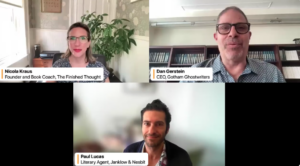As one of President Obama’s longest-serving speechwriters, our friend Terry Szuplat received a master class in connecting with and inspiring an audience. But even with that unique experience, he left the White House feeling the same discomfort with speaking in public himself that so many of us do.
So once Szuplat returned to civilian life, and was being invited to give speeches about his time in Obamaland, he pushed himself to overcome his fears and find his voice.
In his new book Say It Well, which is being released this week, Szuplat documents his journey and the life-changing lessons he learned from President Obama in hopes of helping others find their own voice too. The result is an accessible and invaluable handbook full of concrete tips for crafting and delivering compelling speeches and presentations.
In advance of the book’s publication, we asked Terry to share some of the key insights he gained from his time collaborating with President Obama and how we mortals can apply them to become better speakers and communicators.
Can you tell us a little about yourself and your background? Specifically, how did you get into speechwriting?
Like so many speechwriters, I kind of fell into it! Growing up in East Falmouth, Massachusetts, I had no idea that speechwriting was something you could make a career of. In college, I dreamed of going to law school and arguing cases before the Supreme Court. But a funny/not-so-funny thing happened on the way to law school. I didn’t get in. Anywhere!
In retrospect, not getting into law school turned out to be a blessing. Because just as one door closed, another started to open. And now that I look back, maybe my path was going to lead me to speechwriting all along.
As a kid, I’d always been fascinated by politics, government, and world affairs. East Falmouth is on Cape Cod—down the road from Hyannis Port, so the Kennedy mystique was always all around us. When I was a teenager, my Mum gave me an album of JFK speeches that I listened to over and over. To my young ears, they weren’t just speeches; they were pieces of music filled with lyricism, poetry, cadence.
During my senior year at American University in Washington, D.C. I was given an incredible opportunity—an internship at the White House. I was assigned to President Bill Clinton’s foreign policy speechwriters. Mostly, I just did research. One day, they let me take a crack at writing something: brief remarks the president would deliver to U.S. embassy staff in a newly independent Ukraine. As a Ukrainian-American, I had to pinch myself. They had to rewrite most of what I drafted, but I was 22 years old, helping craft the words of a president, and I began to think that maybe, just maybe, I might be able to be a presidential speechwriter someday, too.
A few years later, I got my first real speechwriting job—a junior speechwriter for the U.S. Secretary of Defense. Within a few years, all my superiors had moved on. Suddenly, I was the most “senior” person in the office at about 25 years old, and I became the chief speechwriter at the Pentagon.
You were one of Barack Obama’s longest-serving speechwriters. What did you admire most about his speaking skills? Or can you identify the attributes of his public speaking that have led him to be regarded as one of the greats?
This is one of the major themes of Say It Well. A lot of the book is my conversations over the years with President Obama that I share for the first time: how he at times struggled as a speaker as a young community organizer in Chicago, how he worked to become a better communicator and ultimately became the gifted orator we all saw at the 2004 Democratic convention in Boston, mistakes he made along the way as both a candidate and as president, and why he communicated the way he did in the White House.
I was a volunteer speechwriter at the 2004 convention, and I was on the floor among the delegates when a young state senator from Illinois walked out on stage and, in just 16 minutes, delivered a speech for the ages. I mean, when you speak for 16 minutes and then people across the country are suddenly talking about you as possibly a future president—that’s a speaker from whom we can all learn.
To me, the magic of that moment, and so many of Obama’s speeches, was not just the elegance of his writing or the power of his delivery. Most importantly, he did what all great speakers do—what we can all do. He connected his personal story (the son of a Black father from Kenya and a white mother from Kansas) with a larger story—the work of building a strong, multicultural America that sees its diversity not as a weakness to be exploited for political gain, but as one of our greatest strengths, to be celebrated and nurtured.
That was his core message—a message of inclusion, unity, and hope—from his first major speech at the 2004 convention to his farewell address as president and every speech since. And if you’re writing or giving a speech yourself, I think that tapping into the hopes of your listeners is still the best way to inspire any audience, whether it’s your company, community, or country.
Your new book Say It Well offers tips and tricks for public speaking. What is the most common public speaking mistake you’ve observed among speakers throughout your career — and how can speakers correct it?
I think one of the most common mistakes that many speakers make is that they never take the time to think deliberately and deeply about what they want their message to be: what they want their audience to remember and act on. We see it all the time in our organizations—
—in business, government, academia, advocacy, philanthropy. The CEO, president, or executive calls a meeting to discuss their upcoming speech. There’s a room full of people. Everyone talks. And talks. And talks. Everyone is offering ideas—so many ideas. The boss talks too, maybe for 20 minutes, about what he or she wants to say in their five minutes of remarks.
I’ve been in this situation so many times. And then I ask the group, “In one sentence, what’s the core message that we want the audience to remember?” Silence. No one knows.
A speech or presentation can’t be about everything. If it is, the audience will remember nothing. Effective speakers and leaders can boil down their message to one sentence in advance, before they ever try to write a word of their presentation.
Whenever we met with President Obama in the Oval Office before a big speech, he’d start the conversation by asking, “What’s the story we’re trying to tell here?” In Say It Well, I offer a process–specific steps–to help any leader and organization zero in on the core message that they want their audience to remember and act on.
Many of Gotham Ghostwriters’ clients are thought leaders and experts in very particular fields. Do you have any tips for speakers who, like them, speak about very specific topics but still want to engage and move audiences from all backgrounds?
I hear this all the time from speechwriters who come to my training sessions and workshops: “I write for an expert in their field who mostly speaks to other experts…” “My client prefers to speak in data and statistics…” “My CEO only wants to talk about their products and services…” “…and, as a result, their presentations are…not that inspiring.”
I get it. The more technical the topic or the more erudite the audience, the more many speakers think they need to limit their presentations to the language that the audience, often experts as well, knows best. But here’s the thing: Experts are human beings too. And as I discuss in the book, we know from countless studies that the single best way to connect with and motivate another human being is through stories, not statistics; emotion, not arguments; pathos, not logos.
Again, experts are humans, too. If you’re speaking to an audience of policymakers, engineers, psychologists, or statisticians, remember: they read books and go to the movies, too. Because they also love stories. In every chapter of Say It Well, I lay out the different kinds of stories that can help any speaker, even experts, connect with their audience in the way that matters most: emotionally.
Is there anything else you want potential readers to know about this book or public speaking generally?
In Say It Well, I open up about my own struggles with public speaking and how I worked to get better. For my 25 years as a speechwriter, I was far more comfortable being behind the scenes writing speeches for others. After leaving the White House, I tried to put myself out there more—giving interviews and speaking to small groups. Sometimes, I was OK. Usually, I was gripped with anxiety. One time I froze up. It was embarrassing. After that, when I was invited to speak somewhere, I started making up excuses why I couldn’t. It felt safer not to speak.
Then, I was invited to give a major speech. I had to make a decision: keep hiding from what scared me or finally face my fears. I decided to try. I had months to get ready. I tried to remember everything I’d learned from President Obama and use those techniques to become a better speaker myself. And it worked. I gave the first big speech of my life. I finally found my voice. After that experience, and with a lot of practice since, I can speak with confidence to just about any audience. Say It Well is the lessons I learned in that journey and how anyone can find their voice, too.



